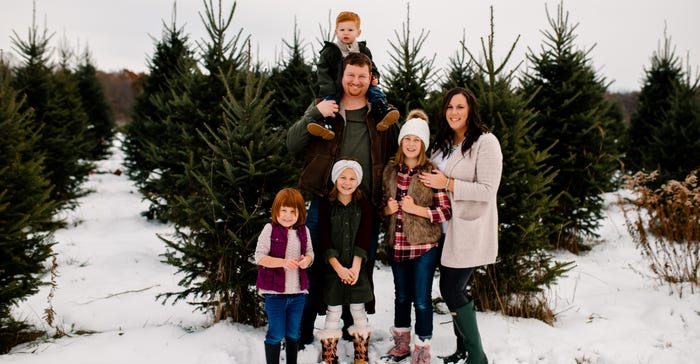
As much as Tony Stefani would like the farm to be his full-time job, as a smaller grower, he thinks the stress of it would take away from the fun of it.
Stefani and his wife, Marci, live in Dexter, and they own and operate a 30-acre, choose-and-cut Christmas tree farm in Manchester with Tony's father, Richard.
Gradual growth to sales of 2,500 Christmas trees is the goal, as Tony enjoys being what he calls “more of a hobby farmer.”
“We currently are only open nine days, and our busy weekends are Thanksgiving weekend and the weekend after,” Stefani says. “Let’s say a huge snowstorm rolls in on Friday night and we lose one of those weekends. There goes maybe 40% of the annual income.
“The stress of that would be paralyzing, which is why I’ll always have an off-farm job — at least in the foreseeable future.”
Hillside Tree Farm, offering six main tree varieties and 2 acres of exotic varieties, is one of more than 500 small to very large Christmas tree growers in Michigan that manage about 37,000 acres in commercial Christmas tree production, according to Amy Start, executive director of the Michigan Christmas Tree Association.
Michigan ranks third in the nation in the number of Christmas trees harvested.
It supplies about 2 million fresh Christmas trees to the national market each year.
The experience
Like most choose-and-cut operations, the goal is to produce more than just a Christmas tree.
“We hope to provide memories that will last a lifetime,” says Stefani, who in years past has offered wagon rides, a warming barn, concessions, a fire pit, kids activities and more. However, this year with COVID-19, operations have had to change.
Stefani says he looked at every operation on the farm and put either a process to monitor and clean or not to offer it if they couldn’t maintain the rules of social distancing and sanitizing.
“In the warming barn, there is little ventilation and with just 15 people, it would be packed,” he explains. “It wouldn’t be safe, so we are not opening it this year.”
In the welcome area where guests receive instructions on procedure, variety location and pricing, ropes and other markings were installed, and all employees wear face coverings.
“Unfortunately, we will not be offering wagon rides either because of there being too many common touch points and the amount of distancing required,” he says.
Even though it won’t be a normal year, he still thinks it will be a good year.
“Everything from orchards sales and U-pick operations to corn mazes and Christmas tree farms, families are looking for activities they can do together, outside, in a safe manner,” Stefani says.
Start adds, “With people spending more time at home, I feel people will be decorating like crazy this holiday season, and for many that will include a real Christmas tree. We anticipate an increase in the number of families heading to farms to pick out their real Christmas tree. Many people are looking for safe things to do outside with their families, and a Christmas tree farm is the perfect destination. Social distancing isn’t a problem, as the trees are planted 6 feet apart.”
Marketing that experience is now largely done online with a website and social media spaces, such as Facebook and Instagram. Last spring, Stefani started a YouTube channel designed to educate consumers on the types, facts and myths and what it takes to grow the centerpiece of the largest holiday of the year.
“In the future, I want to get involved in some of the local Christmas parades and holiday lighting ceremonies,” he adds.
But, it’s not just consumers he’s trying to reach. He also has video on tips and tricks he’s done to produce great trees. For example, one entire 20-minute video outlines best shearing practices. “I like to show what we do, how we do it and when and why we do it, so that if growers choose, it is easy to implement on their farms,” says Stefani, who also is vice president of the Michigan Christmas Tree Association.
Farm history
Hillside Tree Farm in Manchester was started in 1983 by Stefani’s father, Richard, who had experience working with his father and uncle on a tree farm they owned in Lake City. The lack of staggered plantings meant Hillside Tree Farm closed in 1997 and didn’t open again until another rotation became available in 2008.
Gearing up for new production, Stefani spent every spring break from 2000 to 2005 planting. “It kind of molded me into who I am. I turned out to enjoy it,” he says.
In the meantime, Stefani went to work as an instrumentation engineer for an automotive engineering services company in Plymouth, where he remains.
New planting slowed from 2008 to 2010, as it was still uncertain the family business would continue.
“But then we had our first daughter in 2009, Sophia, and it got me more interested in the farm and sharing it with them,” says Stefani, who now with his wife has four children, ages 3 to 11.
That underplanting is now causing a bit of a shortage on the farm. “Sometimes you just can’t predict the future, where lives will lead or what customers will want, but as much time spent planning up front is not wasted,” Stefani says.
Read more about:
Covid 19About the Author(s)
You May Also Like






